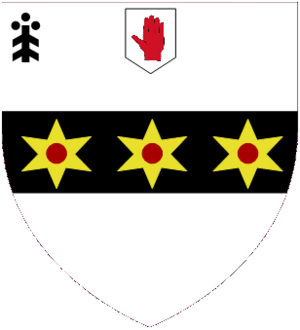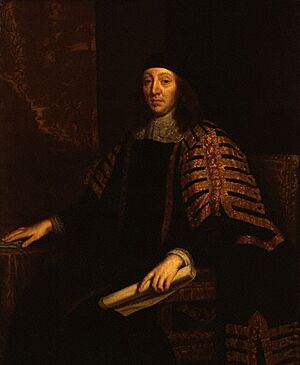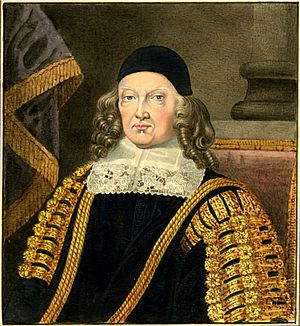Sir Harbottle Grimston, 2nd Baronet facts for kids
Sir Harbottle Grimston, 2nd Baronet (born January 27, 1603 – died January 2, 1685) was an important English lawyer and politician. He was a member of the House of Commons, which is like a part of today's parliament, at different times between 1640 and 1685. He even became the Speaker of the House in 1660. During the English Civil War, he sided with the Parliament (called Parliamentarians) but also had some sympathy for the King's supporters (called Royalists).
Contents
Early Life and Career
Harbottle Grimston was born at Bradfield Hall, near Manningtree. His father was Sir Harbottle Grimston, 1st Baronet. Harbottle went to Emmanuel College, Cambridge for his education. After that, he became a barrister, which is a type of lawyer, at Lincoln's Inn. He worked as a recorder (a legal officer) for the towns of Harwich and Colchester. In 1628, he was chosen to represent Harwich in Parliament.
Grimston in the Short and Long Parliaments
In 1640, Grimston represented Colchester in what was called the Short Parliament. He continued to represent Colchester in the Long Parliament that followed. He quickly became a key member of the "popular party," which supported the Parliament's power. He strongly spoke out against Archbishop Laud. Grimston was part of important committees in Parliament, including one that looked into the King's attempt to arrest five members of Parliament. In January 1642, he became a deputy-lieutenant for Essex, helping to organize the local military.
Role During the English Civil War
Harbottle Grimston did not like the idea of fighting against the King. Even though he was officially on the side of Parliament during the English Civil War, he didn't fully agree with all their actions. As Clarendon said, he "continued rather than concurred with them." It seems he did not sign the Solemn League and Covenant, an agreement to support Parliament against the King. However, after the first part of the war ended, he became more active again.
Negotiations with King Charles I
In 1647, Grimston led the committee that investigated how King Charles I escaped from Hampton Court. In 1648, he was one of the people who talked with the King at Newport. During these talks, Burnet said that Grimston even knelt and begged the King to agree to a peace deal. Also in 1648, he became the 2nd Baronet after his father died, as his older brother had passed away earlier.
Grimston's Imprisonment and Retirement
Around this time, Grimston started to show more support for the Royalists (the King's side). He was removed from the House of Commons when Colonel Pride "purged" (removed members from) the assembly. Grimston was even put in prison. He was later released after promising not to do anything against Parliament or the army. He then spent the next few years living quietly away from politics.
Return to Politics and Speaker of the House
In 1656, Grimston was elected to Parliament again, representing Essex. However, he was not allowed to take his seat. He and 97 other members who were also stopped from joining Parliament wrote a public protest.
In February 1660, Grimston was among the members who were allowed back into the Rump Parliament. He then became a member of the council of state, which was an important governing body. Later that year, he was chosen as the Speaker of the House of Commons in the Convention Parliament. As Speaker, he visited King Charles II in Breda and welcomed him back to London with very kind words. However, he refused the King's request to fire Burnet, who was his chaplain (a religious advisor). In Parliament, Grimston also strongly spoke out against making laws less strict for Catholics.
Master of the Rolls
Grimston did not stay as Speaker after the Convention Parliament ended. However, he was part of the group that tried the people who had been involved in the King's execution. In November 1660, he was given the important job of Master of the Rolls, a high legal position. Some say he paid a large sum of money for the job, but Burnet said he got it without even asking. Burnet, who was his friend and chaplain, spoke highly of Grimston's fairness and religious devotion. He also noted that Grimston was very firm against Catholicism.
In 1661, Harbottle was re-elected to Parliament for Colchester. He was elected again in 1679 and 1681.
Works and Family Life
Harbottle Grimston translated the law reports of his father-in-law, Judge Sir George Croke. These reports were written in an old language called Norman-French. His translation was published five times. He also had seven of his speeches from Parliament published. He wrote a book called Strena Christiana as well.
Grimston's Family
Grimston's first wife was Mary, the daughter of Sir George Croke. They had six sons and two daughters. His second wife was Anne Meautys, who was the widow of Thomas Meautys and the daughter of Sir Nathaniel Bacon. With Anne, he had one daughter.
His son George married Sarah, who later became the Duchess of Somerset. However, George died in 1655. Only one of Grimston's sons, Samuel (1643–1700), lived longer than his father. When Samuel died in 1700, the baronetcy (a title of honor) ended.
Sir Harbottle's oldest daughter, Mary, married Sir Capel Luckyn, 2nd Baronet. Their grandson, William Luckyn, inherited the family estates from his great-uncle, Sir Samuel Grimston. In 1700, William Luckyn took the name Grimston. This William Luckyn Grimston (around 1683–1756) was given the titles Baron Dunboyne and Viscount Grimston in Ireland in 1719. His son James (1711–1773) became the 2nd viscount. James's son James Bucknall (1747–1808) was made an English peer (a noble) as Baron Verulam of Gorhambury in 1790. Then, in 1815, his son James Walter Grimston (1775–1845) became the Earl of Verulam. Sir Harbottle Grimston bought the estate of Sir Nicholas Bacon at Gorhambury, which became the home of his descendants.
Arms
 |
|
 | James Van Der Zee |
 | Alma Thomas |
 | Ellis Wilson |
 | Margaret Taylor-Burroughs |



